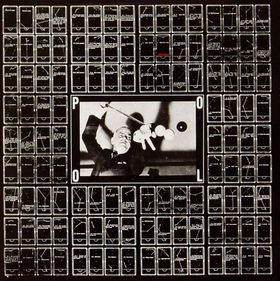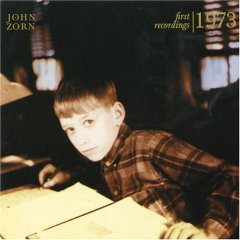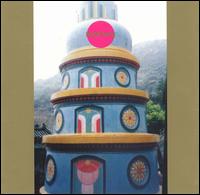
Bar Kokhba is a double album by John Zorn, recorded between 1994 and 1996. It features music from Zorn's Masada project, rearranged for small ensembles. It also features the original soundtrack from The Art of Remembrance – Simon Wiesenthal, a film by Hannah Heer and Werner Schmiedel (1994–95).

John Zorn is an American composer, conductor, saxophonist, arranger and producer who "deliberately resists category". His avant-garde and experimental approaches to composition and improvisation are inclusive of jazz, rock, Jewish music, hardcore, classical, contemporary, surf, metal, soundtrack, ambient, and world music. Rolling Stone noted that "[alt]hough Zorn has operated almost entirely outside the mainstream, he's gradually asserted himself as one of the most influential musicians of our time".

The Big Gundown is the third studio album by American composer and saxophonist/multi-instrumentalist John Zorn. It comprises radically reworked covers of tracks by the Italian film composer Ennio Morricone.

Filmworks 1986–1990 features the first released film scores of John Zorn. The album was originally released on the Japanese labels Wave and Eva in 1990, on the Nonesuch Records label in 1992, and subsequently re-released on Zorn's own label, Tzadik Records, in 1997 after being out of print for several years.
"For Zorn, filmscores have always been a place to experiment, and the FilmWorks Series is in many ways a microcosm of his prodigious output. This original installment of the FilmWorks Series presents three scores ranging from punk-rockabilly ; a jazzy Bernard Herrmann fantasy; to a quirky classical/improv/world music amalgam for Raul Ruiz's bizarre film The Golden Boat. Zorn's infamous one-minute arrangement of Morricone's classic The Good, The Bad and The Ugly, is included as a bonus track. This is the place where it all began."

Pool is an album by John Zorn featuring his early "game piece" composition of the same name which was first released on vinyl on Parachute Records in 1980 as a double album including the composition "Hockey". The album was released on CD on Tzadik Records with an additional bonus track featuring a test recording of Archery as part of The Parachute Years Box Set in 1997 and as a single CD in 2000. The album was the first released solely under Zorn's name following his collaboration with Eugene Chadbourne, School (1978).

Locus Solus is an album of improvisations by John Zorn and other musicians. Originally released as a double vinyl album on Rift records in 1983 it was re-released as a CD with additional tracks on Eva/Wave in 1990 and on Zorn's Tzadik Records label in 1997.

Ganryu Island is an collaborative album by John Zorn and Michihiro Sato. The album was first released on vinyl LP on Yukon Records in 1984 and later re-released on Tzadik Records as a CD with five additional tracks in 1998.

Godard/Spillane is a compilation album by American composer and saxophonist/multi-instrumentalist John Zorn consisting of music created through Zorn's file-card compositional process. The composition "Godard", a tribute to French film-maker Jean-Luc Godard whose jump-cut technique inspired Zorn's compositional approach, on the French tribute album Jean-Luc Godard|Godard ça vous chante? in 1986 issued by the French Nato label. "Spillane" was first released on Zorn's Nonesuch Records album Spillane in 1987, and "Blues Noël" was first released on the compilation album Joyeux Noël - Merry Christmas Everybody! on Nato in 1987.

50th Birthday Celebration Volume 9 is a live album by John Zorn featuring a solo performance at Tonic in September 2003 that was part of his month-long 50th Birthday Celebration concert series. It is a continuation of his solo work documented on The Classic Guide to Strategy Volumes 1 & 2.

50th Birthday Celebration Volume 2 is a live album of improvised music by Milford Graves and John Zorn documenting their performance at Tonic in September 2003 as part of Zorn's month-long 50th Birthday Celebration concert series.

50th Birthday Celebration Volume 10 is a live album of improvised music by Yamataka Eye and John Zorn documenting their performance at Tonic in September 2003 as part of John Zorn's month-long 50th Birthday Celebration concert series. Guitarist Fred Frith also appears on one track.

First Recordings 1973 is a compilation album by John Zorn featuring recordings that he made while still a student between 1973 and 1974 which was released on the Tzadik label in 1995.

Nani Nani is an album of improvised music by American composer and saxophonist/multi-instrumentalist John Zorn and Yamataka Eye. A sequel album Naninani II was released in 2004.

Masada Anniversary Edition Volume 3: The Unknown Masada is the third album in a series of five releases celebrating the 10th anniversary of John Zorn's Masada songbook project. It features twelve previously unreleased Masada compositions performed by Erik Friedlander's Quake (1), Rashanim (2), Dave Douglas (3), Tatsuya Yoshida (4), Naftule's Dream (5), Jamie Saft (6), Zahava Seewald (7), Koby Israelite (8), Julian Kytasty (9); Fantômas (10), Wadada Leo Smith and Ikue Mori (11), and Eyvind Kang (12).

The Parachute Years: 1977–1981 is a compilation album 7-CD box set by John Zorn. It features recordings of Zorn's game pieces originally released as self-produced albums on the Parachute label as well as previously unreleased performances. All of the discs in this box set have been subsequently given their own releases on Zorn's Tzadik label.

Masada Anniversary Edition Volume 2: Voices in the Wilderness is the second album in a series of five releases celebrating the 10th anniversary of John Zorn's Masada songbook project. It features 24 compositions by Zorn, each performed by different ensembles.

Stolas: Book of Angels Volume 12 is an album by the Masada Quintet featuring Joe Lovano performing compositions from John Zorn's Masada Book Two. This is the first known recording by the Masada Quintet.

I Hate to Sing is a live album by American composer, bandleader and keyboardist Carla Bley recorded at the Great American Music Hall in 1981 combined with three tracks recorded at Grog Kill Studios in 1983 and released on the Watt/ECM label in 1984.

The Watchman is a 1996 album by cellist Erik Friedlander which was released on the Tzadik label.

Blues for Falasha is a posthumously released album by saxophonist Glenn Spearman. It was recorded on June 8, 1997, at Bay Recording in Berkeley, California, and was released in 1999 by Tzadik Records as part of their Radical Jewish Culture series. On the album, Spearman is joined by saxophonist Larry Ochs, pianist Chris Brown, bassist Lisle Ellis, and percussionists Donald Robinson and William Winant.





















